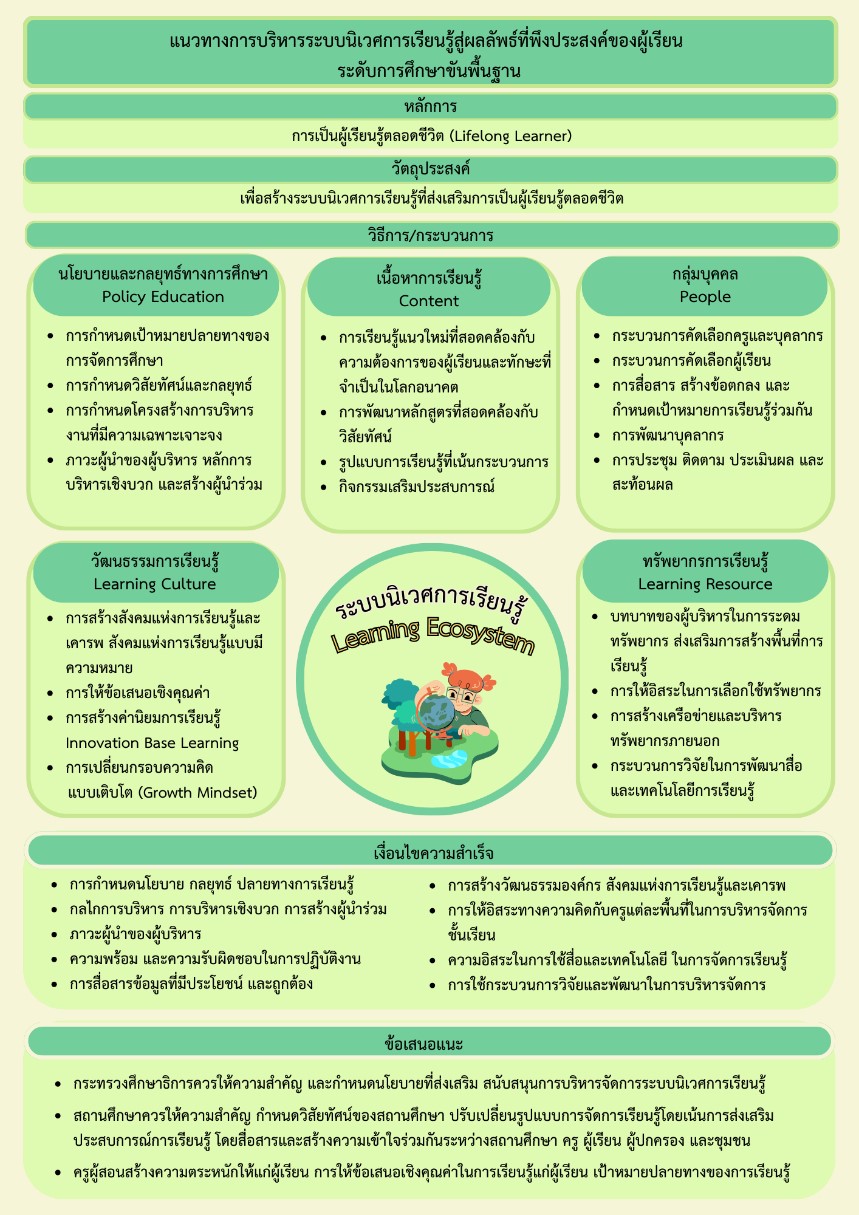Guidelines for Managing the Learning Ecosystem towards Desired Outcomes of Learners in Basic Education
Main Article Content
Abstract
The purposes of this research were 1) to synthesize and confirm the components of the learning ecosystem, 2) to study the processes and best practices in managing the learning ecosystem, and 3) to develop and validate management guidelines for the learning ecosystem. The sample group consisted of 500 participants, administrators and teachers affiliated with the Basic Education Commission. The research tools included questionnaires on perceptions of the learning ecosystem components, with an Item Objective Congruence (IOC) value between 0.80 and 1.00, with a reliability value 0.969. Data were collected through questionnaires, analyzed using Mplus software for confirmatory factor analysis, and supplemented with qualitative data gathered from interviews with 7 qualified individuals. Additionally, focus group discussions with 7 qualified individuals were conducted to validate the management guidelines for the learning ecosystem. And interviews to explore management guidelines. Analyze data used content analysis.
The results revealed that:
1. The learning ecosystem comprised five components: 1) educational policies and strategies, 2) learning content, 3) personnel, 4) learning culture, and 5) learning resources.
2. Effective management of the learning ecosystem requires promoting and supporting four main areas: 1) reasons/motivations contributing to system development, 2) management processes, 3) success conditions affecting system management, and 4) recommendations.
3. Management guidelines for achieving desired learning outcomes encompass 5 main aspects: 1) principles, 2) objectives, 3) methods/processes, 4) success conditions, and 5) recommendations. Overall, the validation of these guidelines demonstrated high levels of suitability, feasibility, and utility.
Article Details

This work is licensed under a Creative Commons Attribution-NonCommercial-NoDerivatives 4.0 International License.
เพื่อให้เป็นไปตามกฎหมายลิขสิทธิ์ ผู้นิพนธ์ทุกท่านต้องลงลายมือชื่อในแบบฟอร์มใบมอบลิขสิทธิ์บทความ ให้แก่วารสารฯ พร้อมกับบทความต้นฉบับที่ได้แก้ไขครั้งสุดท้าย นอกจากนี้ ผู้นิพนธ์ทุกท่านต้องยืนยันว่าบทความ ต้นฉบับที่ส่งมาตีพิมพ์นั้น ได้ส่งมาตีพิมพ์เฉพาะในวารสาร วิชาการธรรม ทรรศน์ เพียงแห่งเดียวเท่านั้น หากมีการใช้ ภาพหรือตารางของผู้นิพนธ์อื่นที่ปรากฏในสิ่งตีพิมพ์อื่นมาแล้ว ผู้นิพนธ์ต้องขออนุญาตเจ้าของลิขสิทธิ์ก่อน พร้อมทั้ง แสดงหนังสือที่ได้รับการยินยอมต่อบรรณาธิการ ก่อนที่บทความจะได้รับการตีพิมพ์References
คมสัน จันทร์เพ็งเพ็ญ, พนายุทธ เชยบาล และสมคิด สร้อยน้ำ. (2566). ปัจจัยที่มีอิทธิพลต่อคุณภาพโรงเรียนขนาดเล็ก สังกัดส านักงานเขตพื้นที่การศึกษาประถมศึกษาในภาคตะวันออกเฉียงเหนือ. Journal of Roi Kaensarn Academi, 8(9), 239-247.
ณัฐนันท์ วิจิตรอักษร และนครินทร์ อมเรศ. (2566). ภาพอนาคตประเทศไทยรายได้สูง: มุมมองตลาดแรงงานในอนาคต. เข้าถึงได้จาก https://tdri.or.th/wpcontent/uploads/2023/01/HIT_Labor_NW.pdf
ประทีป คงเจริญ และวารีรัตน์ แก้วอุไร. (2566). ผลการใช้กิจกรรมการเรียนรู้ตามแนวคิดกระบวนการคิดเชิงออกแบบร่วมกับแนวคิดการทำงานอย่างมีส่วนร่วมระหว่างโรงเรียน ครอบครัว และชุมชน เพื่อส่งเสริมพัฒนาการด้านทักษะการเรียนรู้และนวัตกรรม สำหรับนักเรียนชั้นมัธยมศึกษาตอนปลาย. Journal of Roi Kaensarn Academi, 8(12), 146-162.
พรรัตน์ จันทร์คำ. (2566). การพัฒนาระบบนิเวศการเรียนรู้เพื่อส่งเสริมทักษะอาชีพของโรงเรียนราชประชานุเคราะห์ 22 จังหวัดแม่ฮ่องสอน. วารสารนวัตกรรมการจัดการศึกษาและการวิจัย, 5(4), 885-896.
รติยากร คชา และดาวรุวรรณ ถวิลการ. (2566). รูปแบบการพัฒนาวัฒนธรรมการเรียนรู้เชิงดิจิทัลในโรงเรียนประถมศึกษาสังกัดสํานักงานเขตพื้นที่การศึกษาประถมศึกษาชัยภูมิ เขต 3. วารสารการวัดผลการศึกษา มหาวิทยาลัยมหาสารคาม, 29(1), 161-175.
สิโรดม มณีแฮด และปณิตา วรรณพิรุณ. (2562). ระบบนิเวศการเรียนรู้ดิจิทัลด้วยปัญญาประดิษฐ์สำหรับการเรียนรู้อย่างชาญฉลาด. วารสารศึกษาศาสตร์ มหาวิทยาลัยนเรศวร, 21(2), 359-373.
อริสา สุมามาลย์, วีระเทพ ปทุมเจริญวัฒนา และหิมพรรณ รักแต่งาม. (2563). การเสริมสร้างเป้าหมายในชีวิตของนักศึกษาด้วยจิตตปัญญาศึกษาและการเรียนรู้ของผู้ใหญ่: กระบวนการเรียนรู้ที่สำคัญและปัจจัยแห่งความสำเร็จ. วารสารวิชาการมหาวิทยาลัยการจัดการและเทคโนโลยีอีสเทิร์น, 17(2), 537-550.
CMU Lifelong Education. (2020). About Chiang Mai Lifelong Education. Retrieved from https://www.lifelong.cmu.ac.th/about
Das, S. (2021). Learning Ecosystems: A Holistic View of Learning. International. Journal of Education and Research, 9(1), 189-202.
Megatrends Watch Institute. (2023). Global Megatrends 2050. Retrieved from http://www.megatrends2050.com
Nunnally, J. C. and Bernstein, I. H. (1967). Psychometric Theory. (3rd ed.). New York: McGraw-Hill.
Theodotou, M. (2020). Learning Ecosystem: Why You Need One, How to Build It. Retrieved from https://www.td.org/insights/learning-ecosystem-why-you-need-one-now-and-how-to-build-it

